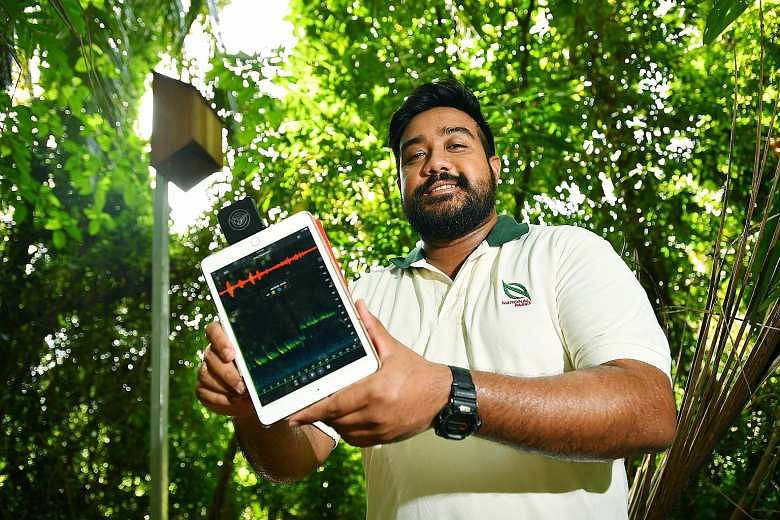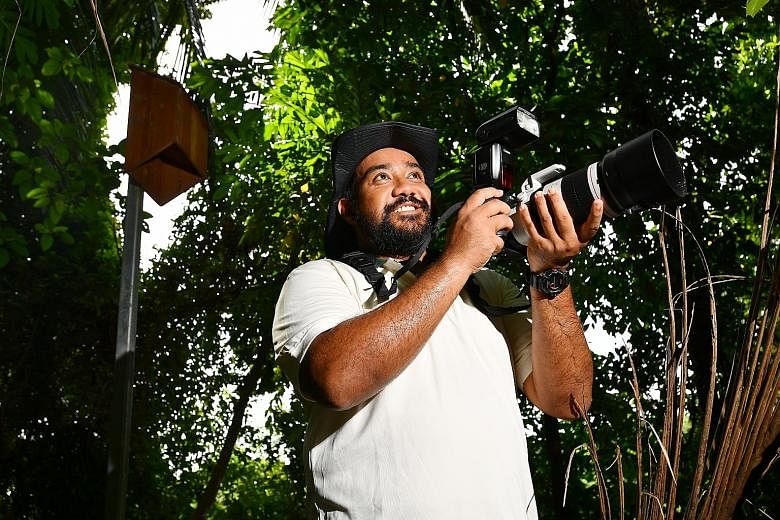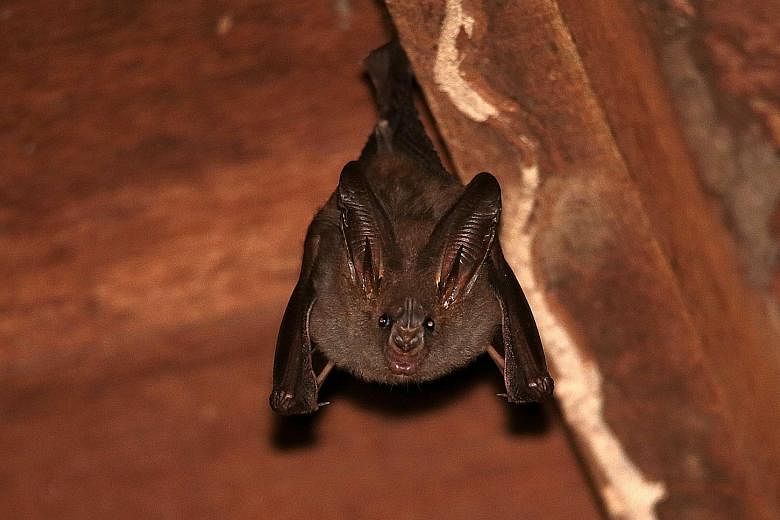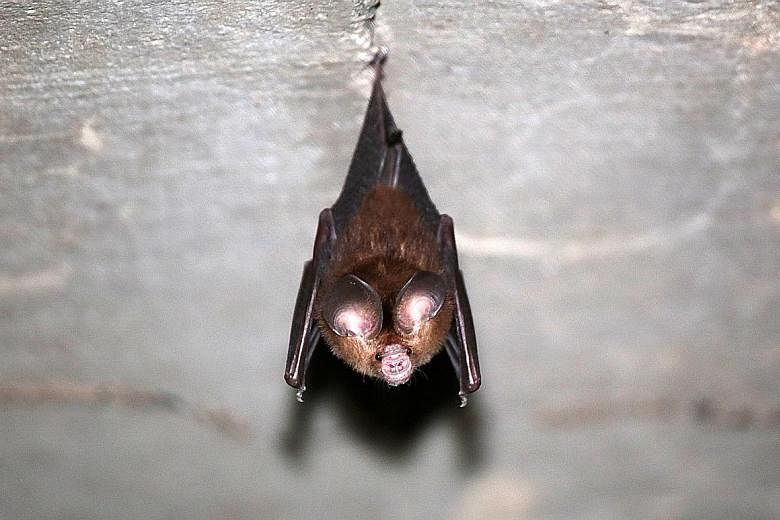With their hairy bodies, razor-sharp teeth and macabre appearances in horror films, bats are feared by many.
However, these creatures of the night actually help maintain a balance in the ecosystem - pollinating plants, dispersing seeds and keeping insect populations in check.
Their numbers worldwide are under threat, with their habitats destroyed by deforestation or colonies wiped out by humans because of fears fuelled by myths about vampires.
In Singapore, the lack of forested areas makes it difficult for bats to thrive. That's why they have earned themselves a spot in the National Parks Board's (NParks) species recovery programme, which is aimed at conserving Singapore's endemic and threatened plants and animals.
About 30 bat boxes and two bat houses, man-made structures for bats to roost in, have been set up across Pulau Ubin. They are meant to promote the growth of more colonies, and to attract new bat species to the island.
NParks' focus is on species that are critically endangered in Singapore, including the Megaderma spasma, known commonly as the Lesser false vampire bat, that lives on Pulau Ubin and Pulau Tekong, and the Hipposideros cineraceus, or the Ashy roundleaf bat, which has been spotted only on Pulau Ubin.
The Ashy roundleaf bat was first recorded here three years ago and, so far, two colonies have been found in abandoned structures, said NParks manager for conservation Noel Thomas, who spotted them during one of his nature surveys.
The exact location of their dwellings is a well-kept secret, to protect the bats from being disturbed by human activities.
-
BAT FACTS
-
Only mammals capable of sustained flight
Associated with vampires in Western cultures, but believed to bring good luck in Asia
There are about 1,000 species of bats, and they make up one-fifth of all mammals
All bats are nocturnal
Bats live an average of 20 years
The popular phrase "blind as a bat" is not quite right - some bats have well-developed eyes which they use to hunt their prey
This bat species, named after its leaf-shaped nose, is not endangered in other parts of South and South-east Asia but its numbers are believed to be small here, and estimated at fewer than 100, said Mr Thomas, who is studying them.
They are forest-dwelling bats which use echolocation. This means the bats produce sounds that bounce around their surroundings and return to their ears, to detect insects to feed on.
Their sighted cousin, the Lesser false vampire bat, is a more established species here with about 120 individuals. Several colonies are found in disused structures around Pulau Ubin. It looks like the vampire bat but does not consume blood, feeding primarily on insects.
"Insect bats can go out and consume insects in large numbers at night, so they do play that ecological role to maintain a balance in nature by keeping insect numbers in check," said Mr Thomas, 35.
Globally, bats make up one-fifth of all mammals, with about 1,000 species of bats, many of which are fruit and nectar bats.
Fruit bats help to disperse seeds while nectar bats pollinate flowers by carrying pollen on their furry coats from one flower to another as they feed on nectar. "They are also important for scientific research... as they have strong antibodies that protect them from contracting diseases," added Mr Thomas.
As part of the bat species recovery programme, the bat boxes and houses were placed last December in various habitats across Pulau Ubin, such as mangroves and coastal forests, to provide more roosting options.
"These species of bats that reside in rainforests around South-east Asia roost in large tree holes which can hold hundreds of bats, but we don't have that kind of environment here," said Mr Thomas, who will be checking all the structures for bat colonies next month.
Research, however, shows that it can take up to three years for bats to colonise such structures. Another effort to promote the conservation of bats includes a survey of known bat colonies to ensure that their environment is hospitable.
NParks officers on why they love their jobs and biodiversity
MS BAZILAH IBRAHIM, HERBARIUM MANAGER, SINGAPORE BOTANIC GARDENS

I love my job because... of the experiences it allows me to be part of. Also, I have awesome colleagues at the Herbarium. They are genuinely passionate about what they do and are always willing to share their knowledge about plants. As a bonus, I get to work in a pretty neat environment.
I find herbarium work fascinating because... I get to work on specimens that have passed through the hands of many celebrated botanists and collectors. I also get a glimpse of Singapore's history and its natural heritage.
I feel that biodiversity is important because... we rely on it for science, research, the economy and more. It tells the story of our natural heritage.
MS HOLLY SIOW, MANAGER OF BIODIVERSITY (TERRESTRIAL), NATIONAL BIODIVERSITY CENTRE

I love my job because… I feel like I can make a tangible difference to the future of biodiversity conservation in Singapore.
I find frogs fascinating because... given their permeable skin (which makes them vulnerable to environmental contaminants), studying the frogs in an area can tell you a lot about the general health of the ecosystem. They are also adorable.
I feel that biodiversity is important because... it plays a critical part in many aspects of our life, such as the views we wake up to each morning, the food we eat, the clothes we wear and even the air we breathe.
MR ZESTIN SOH, MANAGER OF PARKS

I love my job because... there is rarely a typical day at the office. My job allows me to be involved in activities revolving around my passions - working with nature and people in Singapore.
I find bees fascinating because... they arecritical to ecosystems but are under-appreciated and misunderstood. Most people do not realise that Singapore is home to more than 100 native bee species, and that they come in a variety of shapes, sizes and colours - even blue.
I feel that biodiversity is important because... so many incredible stories about the natural world that possess the ability to thrill and teach lie within its intricacies. Also, biodiversity is an irreplaceable part of our natural heritage - we would not be Singapore without it.
MR NOEL THOMAS, MANAGER FOR CONSERVATION (PULAU UBIN)

I love my job because... I get to monitor species that are threatened and propose measures to aid their conservation.
I find bats fascinating because... they communicate in ways we cannot detect without special equipment and are the only flying mammal. They are nocturnal animals that work hard to pollinate our flora and keep insect numbers in check.
I feel that biodiversity is important because... it takes many species to form ecosystems that provide services used by all living things. Better species diversity means natural sustainability for all life forms.




